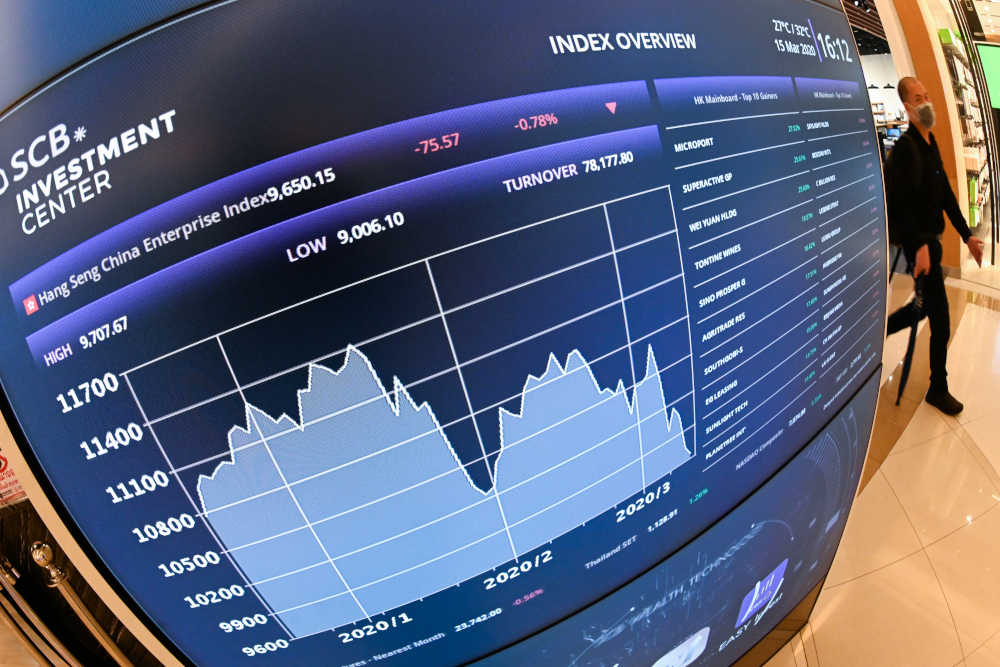HONG KONG, Aug 16 — Asian stocks were mostly down today as weak Chinese economic data, fears of a resurgent coronavirus and the Taliban’s victory in Afghanistan gnawed at investor sentiment.
Retail sales in China expanded 8.5 per cent in July year-on-year and industrial output was up 6.4 per cent, according to figures released by Beijing’s statistics bureau, with both figures below analyst estimates.
Lockdowns and other movement restrictions brought in to combat the country’s recent coronavirus outbreaks have been blamed for hampering economic performance along with a series of deadly floods.
“The spread of domestic outbreaks and natural disasters have affected the economy of some regions, and economic recovery remains unstable and uneven,” National Bureau of Statistics spokesman Fu Linghui told a press briefing.
But he added that “the national economy continues to stabilise and recover” overall.
Raymond Yeung, chief economist for Greater China at ANZ Banking Group, said the figures “suggest the economy is losing steam very fast”.
Surging infections linked to the Delta variant of the coronavirus “also adds extra risk to August’s activities”, he added.
The resurgence of the virus in China was “weighing on investors’ nerves now, especially when one looks at the evolution of outbreaks in the region from Australia to Singapore to Japan and everywhere in between”, said Jeffrey Halley, senior market analyst for Asia Pacific with OANDA.
“If anyone can break the trend, it is China,” he added. “But widespread outbreaks and restrictions would be a game-changer for the Asia recovery, and one could argue, the global one as well when one considers the implications to supply chains.”
Market watchers were also following developments in Afghanistan, where the Taliban have sealed a total military victory in the country’s 20-year war.
“Weaker economic data emanating from China has spoiled the mood, with lower readings on retail sales and industrial production raising questions on whether the recovery momentum can be maintained,” noted Richard Hunter, head of markets at Interactive Investor.
“In addition, there remain some health issues in Asia generally, while geopolitical concerns have also surfaced following the developments in Afghanistan and the implications for the future of the region.”
There were dips in Sydney, Singapore, Taipei, Wellington and Jakarta, as well as Hong Kong, where the Hang Seng Index closed down 0.80 per cent.
Mumbai and Manila were up, as was Shanghai, which closed up 0.03 per cent.
London, Paris and Frankfurt opened lower.
In Tokyo, the benchmark Nikkei 225 index closed down for a third consecutive session on Monday despite government data showing a 0.3 per cent rise in GDP — slightly more than expected after a surge in virus infections and new restrictions.
“Concern remains strong over the economic impact of record coronavirus cases in Japan,” said Yoshihiro Okumura of Chibagin Asset Management.
And in Thailand, the government downgraded its economic growth forecast for 2021 as it battles a fresh Covid-19 wave which has brought record numbers of new infections and deaths.
Having previously forecast growth of 1.5 to 2.5 per cent for the year, the Office of the National Economic and Social Development Council announced it had to revise that figure down to between 0.7 and 1.2 per cent.
‘Potential tapering’
The University of Michigan reported Friday that US consumer sentiment plunged to its lowest level in a decade, as coronavirus infections continue to surge in the country.
Long-lingering fears over an end to the US Federal Reserve’s vast financial support put in place at the start of the pandemic continued to weigh on sentiment.
Traders will keep an eye on Fed boss Jerome Powell’s speech at this month’s gathering of central bank and finance leaders in Jackson Hole, Wyoming, hoping for a hint at when he will act.
“Markets are going to have to get comfortable with potential tapering from the US Federal Reserve sometime next year,” Martin Lakos of Macquarie Bank told Bloomberg Television. — AFP






















